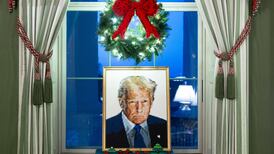The United States ambassador to the United Nations, Nikki Haley, struck a defiant tone at a meeting of the UN Security Council on Friday, insisting that the US would “not be lectured” by other countries about the Middle East.
Speaking at a meeting called in the wake of president Donald Trump’s controversial decision to recognise Jerusalem as the capital of Israel, Ms Haley suggested that the United Nations had damaged rather than helped peace prospects through its unfair treatment of Israel.
“Israel will never be, and should never be, bullied into an agreement by the United Nations, or by any collection of countries that have proven their disregard for Israel’s security,” she said, arguing that the US still had credibility with both Israelis and Palestinians.

I fulfilled my campaign promise - others didn’t! pic.twitter.com/bYdaOHmPVJ
— Donald J. Trump (@realDonaldTrump) December 8, 2017
She added that the US would “not be lectured to by countries that lack any credibility when it comes to treating both Israelis and Palestinians fairly”.
Mr Trump’s declaration and his decision to move the US embassy from Tel Aviv to Jerusalem has risked isolating the US from most of the international community in terms of Middle East policy and prompted protests throughout the region.
Palestinian president Mahmoud Abbas said on Friday that the US was “no longer qualified” to sponsor the peace process.
Even before this week’s announcement, the Trump administration had criticised the UN’s stance on Israel, accusing the international body of an anti-Israel bias.
During yesterday’s hearing, Britain’s ambassador to the UN, Matthew Rycroft, urged the US to come forward with concrete proposals on an Israeli-Palestinian peace deal, describing this week’s move by the Mr Trump as “unhelpful”.
Egypt’s UN ambassador Amr Aboulatta said the US decision would have “a grave, negative impact” on the peace process.
In Paris, US secretary of state Rex Tillerson struck a slightly more conciliatory tone, insisting that the Jerusalem move did not indicate any decision on the final status for the city or undermine the US’s openness to a two-state solution.
Speaking during his scheduled visit to France – a country that has been one of the strongest critics of the US’s plans to move its embassy – Mr Tillerson said that the relocation “is not something that is going to happen this year, probably not next year”.
He also stressed Mr Trump’s decision does not “indicate any final status for Jerusalem”, adding that the “final status, including the borders, would be left to the parties to negotiate and decide”.
As protests continued on Friday at the US decision, Mr Trump took to Twitter to again highlight his decision to relocate the US embassy, criticising his Democratic presidential predecessors for not doing so.
The president posted a video montage showing Bill Clinton and Barack Obama pledging to move the embassy, tweeting the words: “I fulfilled my campaign promise - others didn’t!”












